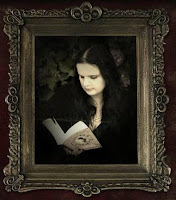(I promise this is positively my last post on the subject).
Sunday, 31 January 2010
February 15th. The last post
(I promise this is positively my last post on the subject).
The more things change...
 I just posted a Louisa May Alcott quote in my blog that I believe serves as a good example of the strikingly similar descriptions of the writing process authors have given throughout time.
I just posted a Louisa May Alcott quote in my blog that I believe serves as a good example of the strikingly similar descriptions of the writing process authors have given throughout time. Looking at novels in which author characters feature, autobiographies of writers, even accounts of writers' behaviour from those who knew (or know) them, it fascinates me that so much of the process has remained so similar for such a variety of people, and in spite of the quite dramatic technological changes that have taken place over time. Writers are, and it seems always have been, a tad dotty.
What are some of your favourite descriptions of the writing process; the ones that ring true for you? Feel free to comment over here so I can collect them all in one place.
F
Tuesday, 19 January 2010
Len Rocks
Thursday, 14 January 2010
Tragic News
Terry wrote that Paul "begged and cajoled me to finish the book," and he was getting a copy ready to send to Paul when the phone rang. The second novel will be dedicated to him.
Terry, this comes to you and to your family with my heartfelt sympathy.
Tuesday, 12 January 2010
February 15th (again)
Monday, 4 January 2010
Featured title for January

History is a matter of perspective . . .
T.G. Morgan’s vivid debut brings to life one of Europe’s most brilliant and enigmatic painters, and compels us to look again at a sensational period in history. In fifteenth century Bruges, master painter Hans Memling is about to find himself at the heart of a political storm that stretches from his home city to Plantagenet England. When Hans agrees to play host to two exiles on the run from their enemies in London, he has no idea that they are not the modest traders they appear to be. Meanwhile, he has come into contact with the powerful Duke of Burgundy. Over the coming years he will grow increasingly close to the duke’s beautiful daughter, the princess Marie, painting her portrait obsessively.
In 1482, Hans takes up an invitation to visit his English friends, who have returned to London following their exile. There he not only find himself caught up in the dramatic final stages of the Wars of the Roses, but also plays a crucial role in the fate of the ‘Princes in the Tower’. Returning home to Bruges, Memling is racked with guilt, for reasons that will only truly become clear as his story draws to a shocking end.
Full of exquisite descriptions of Memling’s art and times, The Master of Bruges is a gripping debut from a bracing new voice in historical fiction.
How did you and Macmillan New Writing meet?
As someone who loves historical novels, the Wars of the Roses and Bruges, I'm especially keen to read The Master of Bruges. Can you tell us how you settled on this particular milieu?
What is your typical writing day?
Do you compose by pen or by keyboard, or what...and why?
None of us writes in a void. Which writers do you feel have had the most influence on you as a writer? (And which do you most enjoy reading - not always the same thing)
Can we please have the traditional Four Random Facts about Terence Morgan?
Terry, thanks for your time, and the best of luck with The Master of Bruges.
